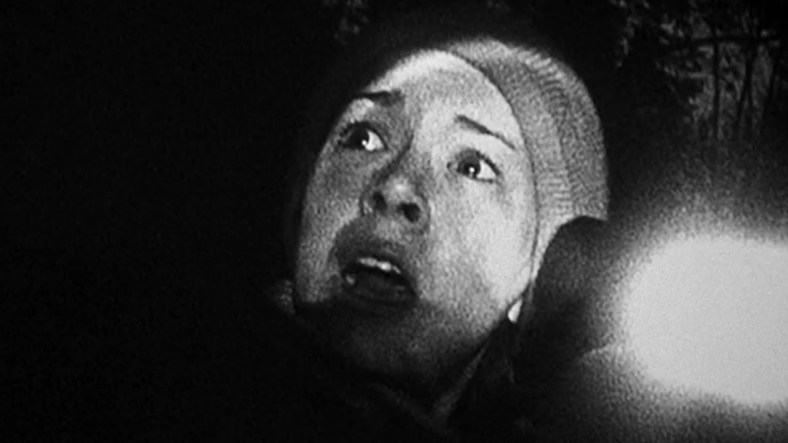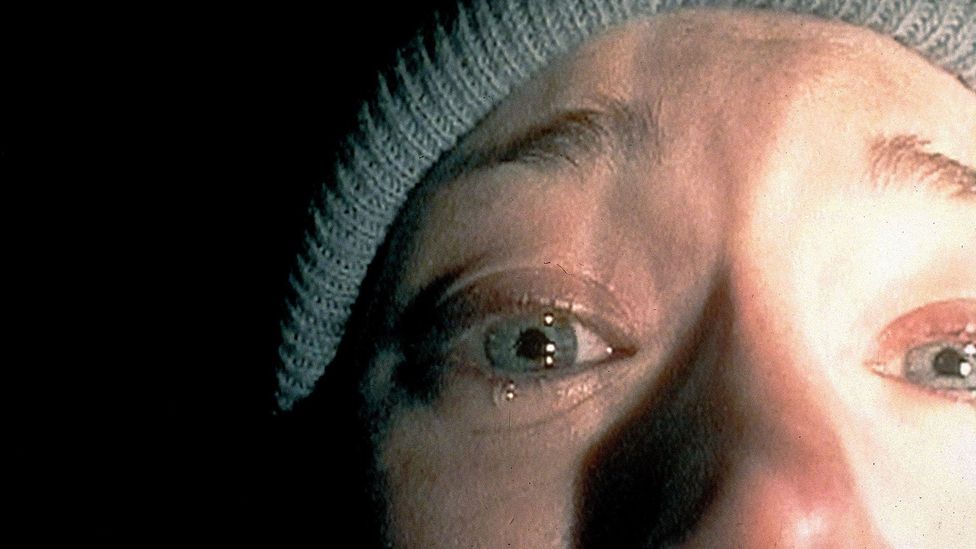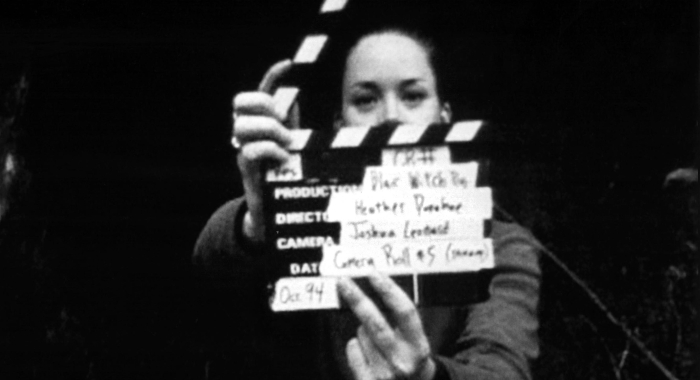Heather Donohue and the Power of Insisting [Matriarchy Rising]

The Blair Witch Project is a landmark of horror cinema. While not the first found footage film, it’s arguably what put the subgenre on the map. The experimental film from directors Daniel Myrick and Eduardo Sánchez is a compilation of the footage shot by three missing filmmakers, Heather Donahue, Josh Leonard, and Michael C. Williams, who venture into the Black Hills of Maryland to make a documentary about the legend of the Blair Witch. Stalked by a mysterious force, they find themselves lost in the woods.
While the witch’s unseen presence in the footage is terrifying, almost as unsettling is the deteriorating relationship between the three friends. Under intense stress, they begin to turn on each other in ways that are both devastating and relatable. Heather, the film’s director, desperately tries to hold everything together in the midst of attacks from a vengeful spirit combined with the harassment and misogyny familiar to millions of women. Pushed to her limits, she maintains control and insists on her vision despite the many obstacles in her way.

Heather Is Always Prepared
Not only the film’s director, Heather is also the leader of this expedition into the woods. In early scenes, she details the reference materials she’s compiled: her field guide, historical records of Blair Witch encounters, and ironically, a copy of How to Stay Alive in the Woods. Along with her topographical map, compass, and filming equipment, it’s clear she is prepared for the task ahead. Later in the film, Mike argues that he agreed to a well-scouted trip implying that’s not what Heather has delivered. But it’s clear that she has prepared as much as possible short of completing the expedition on her own beforehand. Compared to Mike who can’t read the map and Josh who has far less experience with the camera he’s been hired to operate than he previously let on, she is a competent leader.
Heather takes the brunt of the blame when the group gets lost, but she is operating under conditions no one could have predicted. Whatever force haunts the Black Hills is able to bend time and space, subtly shifting either the topographical surroundings themselves or the group’s perceptions of them, causing the three to lose their bearings. At one point they walk due south all day long only to find they have actually been walking in a circle. Josh and Mike continuously remind Heather that she is at fault, but offer no helpful solutions of their own. They occasionally apologize for their cruel words, but she is forced to carry the weight of blame throughout the film. Unknowingly manipulated by an unseen force, Heather’s only mistake was going into the woods to begin with.
A Map And The Horrors Of Gaslighting
Unable to read the map, Mike deems it worthless and kicks it in the river. Perhaps ashamed of what he’s done he claims innocence, letting Heather absorb the force of Josh’s anger for an entire day. Her response to this problem is heartbreaking. She knows she’s done nothing wrong, but also knows that the map is her responsibility. No matter what happened to it, she is at least partially to blame. She continues to ask about it though, knowing she has not been careless with such an important survival tool. Her screams of rage when Mike finally comes clean reveal the amount of shame she’s silently carried, the humiliation and judgment cast upon her by someone who knows the truth and lets her suffer anyway. It’s the essence of gaslighting.
When she asks them again if they took the map, her tone is almost apologetic. Josh essentially ignores her request, threatening her with violence if she makes him angry again. Though Mike is the culprit, Heather is painted as the villain. If she hadn’t insisted on her innocence, would Mike ever have revealed the truth?
Related: How THE BLAIR WITCH PROJECT Could Work as a TV Series
Another instance of gaslighting occurs after she’s stepped in water when crossing a stream. Tired and cold, she’s frustrated and finds the boys’ laughter at her expense triggering. Josh claims they’re just joking, but it’s clear to everyone that they’ve struck a nerve. Rather than apologize, they rebuke her for being too sensitive, a classic response many men give when called out for hurtful behavior. To be fair, we don’t see the instigating conversation. But it’s interesting that Heather would choose this moment to turn on the camera, seeking proof of their actions. She insists that they treat her with respect and the camera becomes her witness. As the odd person out in the threesome, she seeks the validation of an imagined audience, the only ally she has.
Midway through the film, Josh wanders off to sit by himself. Becoming emotional, he understandably needs a minute to gather himself. Mike tries to explain this to Heather who insists they keep going. Though she’s reluctant to stop, she gives Josh his space. Upon rewatch, this scene falls in striking contrast to a later scene in which Heather also becomes emotional. Rather than return the courtesy, Josh berates her for constantly filming, kicking her while she’s down. He cruelly recaps the situation and repeatedly states that no one is coming to help her. While mocking her for her directorial role, he’s also reminding her that she is utterly alone. He uses the lens of her own camera against her, accusing her of failure. Though he does later apologize, this is the moment when Heather breaks, screaming that she wants to keep filming because it’s all she has left.
The Camera As A Source Of Strength For Heather
The camera is a source of strength for Heather throughout the film. It gives her control of her creative vision in early scenes and a purpose to focus on as the danger grows. Still believing they will survive, she wants to capture as much footage as possible. The situation may have drastically deteriorated, but she can at least try to wring something positive out of her misery. Viewing events through the camera’s lens also gives her an illusion of control. While she is recording, she can imagine a protective boundary between her and what she fears.
But her filming has another benefit. Her camera gives her proof that she did not fail. Yes, she was the leader of the expedition, but her footage proves she didn’t lose the map. It records the preparations she made and the plans she adjusts when things go awry. By constantly filming her interactions, she insists the world see her for who she truly is; a headstrong young woman who naively walked into a situation more dangerous than she anticipated.
Related: BLAIR WITCH PROJECT Directors Reflect on “Rivers on Snot” in Heather’s Confessional
Any woman who’s ever held a position of leadership knows that women are held to much higher standards than men. Heather knows that as the director, she will be blamed by family and friends as well as Josh and Mike and that a narrative about her incompetence is likely building in their absence. She knows that her perceived failure may be used to prevent other women from attaining leadership positions in the future. If she can provide a record of what actually happened, at least someone will know that she did her best; that she didn’t lead an irresponsible mission that cost three lives. It’s impossible not to view her claim that the camera is all she has through the lens of someone who knows she will be blamed for every mistake; that she will have to earn the trust freely given to men.

Facing Scorn In And Out Of The Film
The scorn piled on Heather does not just come from Josh and Mike. Essentially playing herself in the film, the real Heather Donahue has been mistreated by audiences as well. The iconic scene in which she tearfully apologizes led to her being ruthlessly mocked for her runny nose, another example of a woman’s appearance turned into a focal point of shame. While Myrick and Sánchez were praised for their experimental directing style, Heather, Josh, and Mike were given little credit for improvising all of their dialogue and filming every scene themselves. While frustrating, this was especially harmful to Heather. Due to the film’s verisimilitude, audiences assumed she was not acting. Headstrong and direct in the film, she was labeled a bitch in reality and because of the film’s authentic nature, she had no character name to hide behind.
But perhaps now is the time for justice for Heather. Her iconic scene in the tent, the image for the film’s poster, is heartbreaking. Heather apologizes for everything. She takes responsibility for the tragedy and begs forgiveness from everyone they will leave behind. Heather knows that what has happened to them is out of her control, but she accepts the responsibility because it is her project. She is the captain going down with her ship. Heather blames herself for insisting, but she is right to insist.
Justice For Heather Donohue
Through every challenge, she leans on her preparation knowing Josh and Mike have done none. She trusts her instincts and decides on a course of action because someone has to make a decision. She insists on her vision because she is the only one of the three that has one. Insisting she protect her team, she ventures into the dark and deadly night searching for Josh. She follows Mike down into an abandoned basement, never to return.

I have to wonder what would have happened if the witch hadn’t targeted the three filmmakers. I like to think, given the chance to make her movie, that it would have been a phenomenal success. Heather’s confidence in her directing is a valuable skill and one highly praised in male auteurs. She insists on an uncompromised vision. And in the end, Heather did produce a fantastic film. Her horror movie is one of the most financially successful ever made. It launched an entire subgenre and continues to uniquely terrify audiences more than twenty years later. Though her character does not survive, a generation of women saw her step behind the camera and began to believe they could too.
Related: Hispanics in Horror: THE BLAIR WITCH PROJECT’s Eduardo Sánchez
Though Heather is far from perfect, she does nothing explicitly wrong in this film. She’s felled by a vengeful spirit whose rage stems from tragedies suffered at the hands of another patriarchal system. The roots of this patriarchal tree are deep and we will likely not see it toppled within our lifetimes. But we keep insisting, because the alternative is to give up our vision for our own lives.
Through her confidence and bravery, Heather becomes a patron saint for women dedicated to seeing their own visions through to the bitter end. Despite our best intentions, we are bound to fail at some point along the way. But Heather gives her life insisting on what she believes. She provides a valuable example of how to keep going despite insurmountable odds and speaks the truth when no one wants to hear it. She insists on being seen for who she is and shows us that we can insist on that too.
Categorized:Editorials Headline Recaps Matriarchy Rising News

